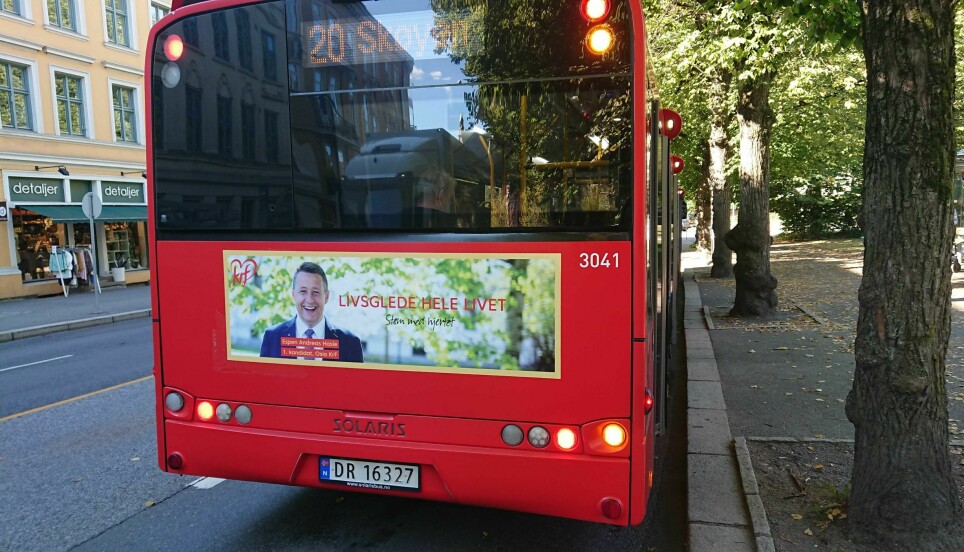
Can political advertising change our minds?
According to US research the answer is no. But advertising affects us in other ways, according to Norwegian researchers.
Is the text message from the Green Party about the climate crisis so persuasive that you would go straight to the nearest polling station to support their candidate?
Or is the Liberal Party candidate’s YouTube video with ten good reasons to vote Liberal so powerful that you would choose them instead?
Little research has been done on political advertising in Norway. But in the United States, studies have been going on for a long time.
The American research shows that political advertising has very little effect on which party people vote for.
Rarely changes people's minds
It doesn’t matter who’s advertising, what the message is or who the intended audience is. The effect is the same, according to a study published in the scientific journal Science Advances last year.
Whether the advert was aggressive, admonishing or funny in tone didn’t matter. Nor did its timing in the election campaign.
The researchers tested 49 different American political advertisements in 59 experiments on 34 000 people.
Can set the agenda
“We know from previous research that getting someone to change their mind is difficult,” says Rune Karlsen, a professor in the Department of Media and Communication at the University of Oslo.
“Changing people's attitudes about a topic or an issue isn’t impossible, but it’s very difficult,” he says.
So why do political parties in Norway spend their money on advertising when it doesn’t seem to have any effect? All Norwegian parliamentary parties spent millions of kroner on advertising during the local elections in 2019, according to a review conducted by the online newspaper Nettavisen.
“Even though the advertisements seem to have little effect on whom we vote for, they can affect us indirectly,” says Karlsen, who is an expert on political communication and media in Norway.
For example, advertising can affect what voters are interested in. They can help put issues on the agenda.
“So seeing an advertisement on what a party thinks about tax policy could make tax policy become a little more important to us. And when we then consider a party or a politician we focus on that issue a little more,” says Karlsen.
Right-wing advertising influenced young first-time voters
Karlsen has researched how political advertising can change people's perceptions of parties and politicians.
He and a colleague conducted an experiment with first-time voters where they were exposed to an advertisement about the Conservative Party's health policy. They watched twenty minutes of TV where the right-wing advert appeared as one of several programmes.
“First-time voters are easier to influence than others because they don’t necessarily have as strong opinions about the parties as older voters do,” says Karlsen.
However, none of the first-time voters changed their party after seeing the advertisement. But many of them changed their minds about Conservatives and health policy.
After seeing the advertisement, they believed that the Conservatives had the best health policy.
“This is an example from Norway of how advertising doesn’t necessarily affect the actual voting, but can affect factors that in turn do affect voting,” says Karlsen.
“So political advertising can work in a lot of ways,” he says.
Reinforces what we already think
Toril Aalberg has also researched politics and the media. She is a professor in NTNU’s Department of Sociology and Political Science in Trondheim.
She believes that although the advertisements most likely do not change our vote, they have a reinforcing effect.
“The effect is primarily about mobilizing people who basically already sympathize with the party,” Aalberg says.
Instead of someone changing their minds about a candidate, advertising might make a candidate even more appealing.
If you’re already sure that you’ll vote for the Liberal Party, then that party’s YouTube video advert will solidify your choice.
Deciding between two parties
According to Aalberg, many voters in Norway decide which party to vote for late in the campaign.
The parties have to somehow ensure that a voter’s decision to vote for their party lasts all the way to election day.
Researchers also know that people often struggle to decide between several parties.
A clear and effective advertising campaign can help to ensure that the right ballot paper gets into the ballot box, according to Aalberg.
Increasing turnout
The adverts can also induce people who would not otherwise vote to actually get out and vote.
“Let's say someone thinks it doesn’t really matter whether they vote or not. Then an advertising campaign appears that makes them feel that something is really at stake, so they go and vote after all,” she says.
Karlsen confirms that American research has shown that political advertising can mobilize people to vote.
However, it can also have exactly the opposite effect.
Negative advertising affects us in other ways than we imagine
“Some studies show that negative advertising actually demobilizes people,” says Karlsen.
In negative advertisements, other parties and political opponents are criticized. Such campaigns have not been particularly widespread in Norway – at least not until now.
However, negative campaigning is very common in the United States.
“When a politician does a lot of negative advertising, the main point is not necessarily to get voters to vote for him or her, but rather to get the opponent's supporters to stay home on election day,” says Karlsen.
But the research on negative advertising differs in the same way as the research on ordinary political advertising.
Some studies show that negative advertising has a demobilizing effect, while others show that it does not.
“Regardless, attempting to demobilize is still something candidates and politicians are doing,” says Karlsen.
“Negative advertising can also lead to less trust, so that people have less confidence in politicians, political parties and the political system,” he says.
This video is an example of a negative advert that the Trump campaign released about opponent Joe Biden in 2020.
American conditions
Karlsen points out that we need to keep in mind that most of the research on political advertising comes from the USA.
“Very little research has been done on the issue outside the US, and even less in Norway,” he says.
Another effect of political advertising – and one that says a lot about the American system – is the greater pressure for campaign funding in the US.
“In the United States, a lot of the campaign focus is on TV advertising, and has been for a long time. The commercials are very expensive, which has led to fundraising becoming an extremely important part of election campaigns,” says Karlsen.
“These expenses apply not only to presidential candidates, but also to candidates running for the US Senate or the House of Representatives. Politicians need to fundraise almost continuously, even between elections, to be able to afford to run for office in the next round,” says Karlsen.
He believes this kind of economic pressure can lead to questionable links between economic interests and politicians who depend on financial support to be re-elected.
“This can create some unfortunate relationships that many people believe the United States has struggled with for a long time,” says Karlsen.
“If political TV commercials become legal in Norway, it would probably lead to fundraising also becoming more important here. This possibility has been an argument against introducing TV commercials in Norway.”
Translated by Ingrid Nuse































